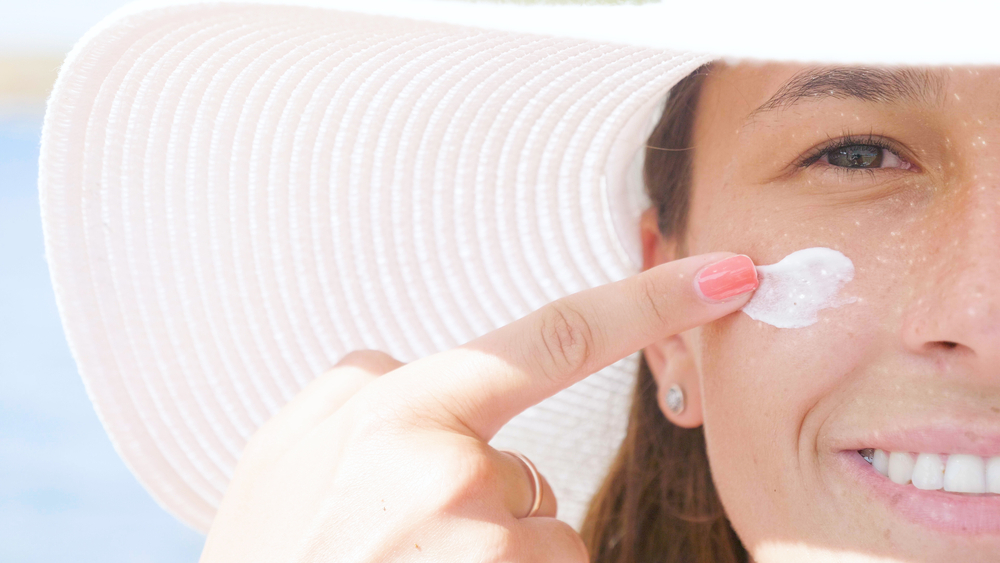It's time to get down to the truth about sunscreen and acne. Many people believe that using sunscreen will make breakouts worse. In fact, it's quite the opposite.
Understanding the benefits of wearing sunscreen daily on your face and body can help you stick to the habit. Of course, the most widely known benefit for people of all sexes, races, and ages is that it helps prevent skin cancer. But what about breakouts? Does sunscreen help acne? You might be surprised by the answer.
What Causes Acne?
Before diving into how sunscreen can help with acne, it's important to explore why acne happens in the first place. The American Academy of Dermatology explains that acne develops when pores get clogged by excess oil, dead skin cells, or bacteria. The resulting inflammation causes the visible blemishes that people are so eager to be rid of. Lack of sleep, stress, and oily makeup, skin care, and hair products can make acne worse.
Treating acne depends on what type of acne you have. In general, it involves regularly using skin care products with specific ingredients to help treat and prevent future breakouts. That's why choosing the right products—especially the right sunscreen—is essential to clear, smooth skin.
Does Sunscreen Help Acne?
According to Dermatologist Marisa Garshick, MD, ultraviolet (UV) exposure from the sun's rays damages the skin's natural barrier and causes acne to dry up, leading to increased oil production. This extra oil can result in more breakouts down the line. UV exposure can also trigger breakouts in people with vulnerable skin, like those with rosacea, worsening existing redness.
A Tan Can Hide the Problem
Garshick notes that many people believe their skin improves when exposed to the sun's UV rays, but this isn't so. Acne and its associated redness and inflammation simply become less noticeable as the skin tans.
By applying sunscreen and keeping your tan in check, you'll be better able to see and address the issue, rather than sweeping it under the rug.
What Are the Benefits of Wearing Sunscreen Daily?
Discoloration and acne scars, also known as post-inflammatory hyperpigmentation, commonly follow breakouts. Both UV and visible light—including light from smartphones, computers, and TVs—can darken these scars, as well as developing pimples. Garshick says it's especially important to use sunscreen daily to keep these conditions from getting worse and help them resolve more quickly.
In addition, some acne medications can heighten the need for sun protection. These medications are filled with ingredients like Retinoids and Salicylic Acid, which can make your skin more vulnerable to sunburn and sun damage. Certain in-office physical treatments can also leave your skin barrier thinner and more vulnerable to UV rays, so sunscreen can complement your regimen by keeping your skin protected.
The sun is also a contributor to dark spots. Wearing sunscreen will help prevent those spots from forming so you won't have more types of blemishes to worry about.
Which Formulas Are Best for Acne-Prone Skin?
If you have acne-prone skin, select a sunscreen that's lightweight and nongreasy. Look for oil-free, noncomedogenic (meaning they won't clog pores) formulations. Dermatologist Robert Finney, MD, recommends using a broad-spectrum sunscreen with an SPF of at least 30, prioritizing lightweight, mineral-based formulas. For example, EltaMD UV AOX Elements is a 100 percent mineral and is gentle enough for the most sensitive skin types.
In addition, look for sunscreens with active ingredients that can soothe and calm the skin. For example, Zinc Oxide in sunscreen has anti-inflammatory properties and can help reduce redness and treat acne. Products with Niacinamide can help calm inflammation, too.
What's the Best Daily Sunscreen for Your Face?
The best daily sunscreen for your face is the one you'll use. Here are some suggestions to help you on your way:
- Prioritize ingredients that meet your needs. For example, EltaMD UV Sheer Broad-Spectrum SPF 50+ contains Zinc Oxide, Hyaluronic Acid to reduce flaking, Vitamin C for antioxidant properties, and Squalene to prevent moisture loss.
- Try a tinted sunscreen. Tinted formulas like EltaMD UV Clear Tinted Broad-Spectrum SPF 46 offer additional protection from visible light and a subtle tint to cover healing blemishes, acne scars, and discoloration.
- Switch up your formula. Stick sunscreens are super simple to apply. A formula like EltaMD UV Stick Broad-Spectrum SPF 50+ is mess-free, easy to reapply over makeup, absorbs and blends easily, and is all-mineral with active Zinc Oxide. Spray sunscreens are a great option, too.
Starting a daily broad-spectrum SPF routine can seem overwhelming. To help form the habit, store daily sunscreen for your face next to your toothbrush, by your keys, or next to your coffee pot so you're more likely to apply it every morning.
Paving the Road to Healthy, Clear Skin
Remember: sunscreen and acne aren't at odds. Sunscreen is an essential part of any healthy skin care routine. The benefits of daily sunscreen for your face extend beyond clearing up acne and post-inflammatory hyperpigmentation. Less sun damage means supporting the integrity of collagen in your skin, which is key to minimizing fine lines and other visible signs of aging. And of course, daily sunscreen use helps prevent skin cancer.
So, find your favorite formula for acne-prone skin and stay on top of your application (and reapplication) game. Your skin will thank you in more ways than one.

